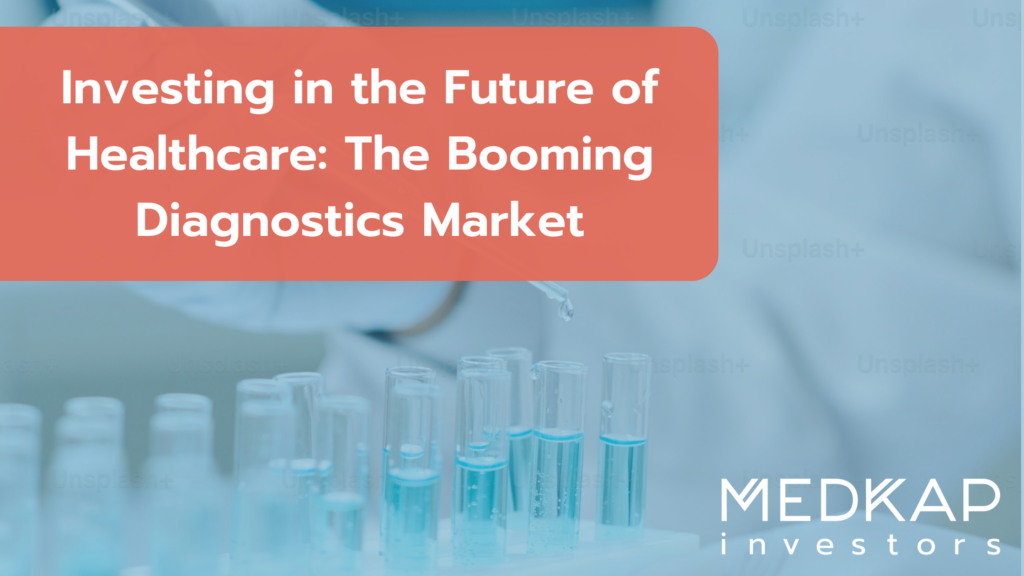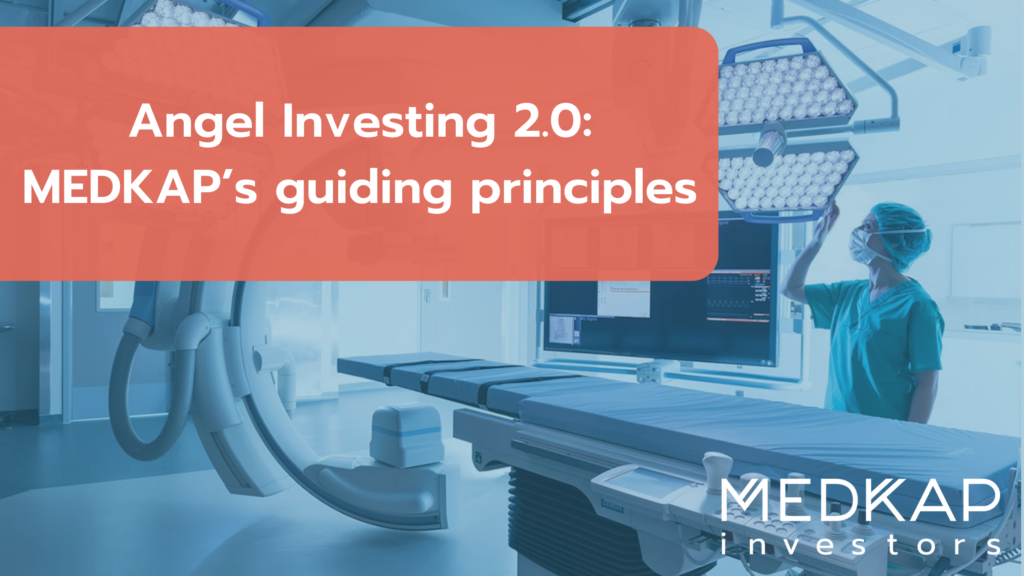The Booming Diagnostics Market
Imagine a world where a simple blood test could detect cancer years before symptoms appear, or where a wearable device could predict a heart attack days in advance. This isn’t science fiction—it’s the rapidly evolving field of medical diagnostics. MEDKAP, the angel investor club focused on HealthTech, is sharing with you why investing in diagnostics isn’t just a smart financial move, but a chance to revolutionize healthcare and save countless lives.
The Diagnostics Market Revolution: A $109 Billion Opportunity
The global diagnostics market is projected to reach a staggering $109.91 billion by 2028, growing at a CAGR of 5.69%. This growth is driven by several factors:
- An ageing global population and rising chronic disease rates
- Increasing demand for personalized medicine
- Rapid advancements in genomics and proteomics
- Expanding healthcare expenditure worldwide
Investing in diagnostics means backing technologies that can transform patient care, slash healthcare costs, and dramatically improve outcomes across the medical spectrum. The COVID-19 pandemic highlighted the sector’s resilience and critical importance to global health security.
Megatrends Reshaping the Diagnostics Landscape
Several powerful trends are propelling the diagnostics sector forward:
- Precision Medicine: Tailoring treatments based on individual genetic profiles.
- Digital Health Integration: Leveraging AI, big data, and IoT in healthcare.
- Point-of-Care Testing: Developing rapid, on-site diagnostic solutions.
- Non-Invasive Diagnostics: Creating technologies that minimize patient discomfort and risk.
- Decentralization of Healthcare: Moving diagnostics closer to patients.
These converging trends are creating unprecedented opportunities for innovative diagnostic solutions. For example, Illumina’s sequencing systems bring high-throughput genomic testing to smaller labs, democratizing access to precision medicine. Additionally, companies like Fitbit and Apple are incorporating advanced sensors and algorithms into their wearables, allowing for early detection of potential health issues.
The Value Proposition: Why Diagnostics Matter
Diagnostics are the cornerstone of effective healthcare, offering:
- Early disease detection, leading to better treatment outcomes
- Accurate monitoring of treatment efficacy
- Reduction in unnecessary treatments and associated costs
- Improved public health through better disease surveillance and management
The Value of Diagnostic Information (VODI) framework demonstrates how diagnostics contribute to improved patient outcomes, healthcare system efficiency, and broader societal benefits. For instance, a study by the Lewin Group found that every dollar invested in lab diagnostics saves $3 in healthcare costs.
Enabling the Future of Personalized Healthcare
Diagnostics are key enablers of personalized medicine by:
- Identifying genetic predispositions to diseases
- Guiding targeted therapies based on molecular profiles
- Monitoring treatment responses in real-time
- Predicting drug efficacy and potential side effects
This personalization leads to more effective treatments, reduced side effects, and better patient outcomes. For example, Foundation Medicine’s comprehensive genomic profiling tests have helped guide treatment decisions for over 500,000 cancer patients, leading to improved outcomes and reduced healthcare costs.
Breakthrough Technologies Reshaping Diagnostics
Recent advancements are expanding the possibilities of early detection and precision medicine:
- Liquid biopsies for cancer detection (e.g., Multi Cancer Early Detection MCED tests)
- CRISPR-based diagnostic tools (e.g., Sherlock Biosciences’ SHERLOCK platform)
- AI-powered imaging analysis (e.g., Arterys’ FDA-cleared cardiac MRI software)
- Wearable devices for continuous health monitoring (e.g., Apple Watch’s ECG feature) and point-of-care diagnostics devices.
- Multiomics approaches integrating genomics, proteomics, and metabolomics
These innovations are not just theoretical—they’re already making a real-world impact. For instance, new MCED tests claim to detect over 50 types of cancer through a single blood draw, often before symptoms appear.
The Funding Landscape: Opportunities and Challenges
While the U.S. has traditionally led in diagnostics funding, Europe is rapidly catching up. In 2023, European healthtech was the 7th most funded industry with $3.3 billion in investments. However, there’s still a gap in funding, especially early-stage, compared to the U.S., presenting opportunities for investors to fill this crucial niche.
The European Union has also recognized the importance of diagnostics, with initiatives like the PACE program offering funding for diagnostic innovations in antimicrobial resistance. This demonstrates the growing support for diagnostics at both private and public levels.
Navigating Challenges and Risks
Despite the immense potential, investors should be aware of several challenges:
- Regulatory hurdles for novel diagnostic technologies
- Integration issues with existing healthcare systems
- Reimbursement complexities for new tests
- Need for more sensitive and specific tests for complex diseases
- Data privacy and security concerns
Additionally, potential risks include:
- Rapid technological obsolescence
- Intense competition, particularly from tech giants entering the healthcare space and established players
- Changing regulatory landscapes that could impact product approvals and market access
Addressing these challenges presents significant opportunities for innovative companies and investors. For instance, developing diagnostics for neurodegenerative diseases like Alzheimer’s remains a critical unmet need with enormous potential impact.
The Convergence of Life Sciences and Digital Health
The intersection of life sciences technologies and digital health solutions is creating new paradigms in diagnostics. For example, Danaher Corporation recently announced the launch of two new centers of Innovation in Diagnostics to Transform Precision Medicine Development.
AI in Diagnostics: A $150 Billion Opportunity
Artificial Intelligence is revolutionizing diagnostics by:
- Enhancing image analysis in radiology and pathology
- Predicting disease risks based on complex data sets
- Optimizing diagnostic workflows and reducing errors
- Enabling real-time analysis of wearable device data
The potential for AI in diagnostics is vast, with projections suggesting it could save $150 billion in healthcare costs by 2026. Companies like Viz.ai are already demonstrating the power of AI in diagnostics, with their stroke detection software reducing time-to-treatment.
Recent Deals and Investments Shaping the Future
Notable recent investments include:
- Thermo Fisher Scientific’s acquisition of Olink Proteomics for $3.1 billion. This deal, announced in late 2023, strengthens Thermo Fisher’s position in the proteomics market.
- Hologic’s acquisition of Ultivue for $412 million. This deal, completed in 2023, expands Hologic’s presence in the spatial biology market, particularly for oncology diagnostics.
- Bruker’s acquisition of PhenomeX for $108 million. This acquisition allows Bruker to enter the single-cell analysis market.
- Roche’s acquisition of LumiraDx’s point-of-care testing technology for $295 million upfront (plus $55 million for development funding). This deal, announced in 2023, strengthens Roche’s position in point-of-care diagnostics.
- Cytek Biosciences’ purchase of the flow cytometry business from Luminex (a DiaSorin subsidiary) for $44.9 million.
- Boston Scientific’s acquisition of Axonics Inc. for $3.4 billion, announced in January 2024. While not strictly a diagnostics deal, it’s a significant transaction in the broader medtech space that could impact the diagnostics market.
- Delfi Diagnostics’ $225 million Series B for early cancer detection using cell-free DNA fragmentation patterns
- Thrive Earlier Detection’s $257 million Series B for multi-cancer screening
- Exai Bio’s $67.5 million Series A for RNA-based cancer detection
- Freenome: $254M (Raised the largest funding in the first half of 2024, known for its blood-based colon cancer detection test)
- BillionToOne: $130M (Closed the second-largest financing deal, a diagnostic and liquid biopsy firm)
- Alamar Biosciences: $128M (Proteomics firm in the genomics and diagnostics space)
- Zephyr AI: $111M (AI-based company focusing on tools and diagnostics)
- Karius: $100M (Specializes in infectious disease diagnostics)
These investments highlight the sector’s potential and investor confidence. The focus on early cancer detection reflects the enormous potential impact and market size in this area.
The Future of Diagnostics: A Bold Prediction
By 2030, we predict that:
- Over 50% of cancer diagnoses will be made through liquid biopsies or other non-invasive methods
- AI-powered diagnostics will be standard in most hospitals, reducing diagnostic errors by over 30%
- Personalized health monitoring through connected wearables and devices will prevent millions of hospitalizations annually
- Diagnostic tests will routinely guide individualized treatment decisions across all major disease areas.
Conclusion: Join the Diagnostics Revolution
Investing in diagnostics is more than a financial opportunity—it’s a chance to shape the future of healthcare. At MEDKAP, we’re committed to backing the innovators who are making these bold predictions a reality.
The convergence of biology, technology, and data science is opening up unprecedented possibilities in diagnostics. We stand at the threshold of a new era in healthcare, where diseases are caught earlier, treatments are precisely tailored, and countless lives are saved through the power of advanced diagnostics
Will you join us in this revolution? Together, we can drive innovation, improve patient outcomes, and create a future where everyone can access the right diagnosis at the right time. The time to invest in the future of diagnostics is now.
If you want to stay updated on Angel Investing in HealthTech at MEDKAP, please
- subscribe to our newsletter
- subscribe to our LinkedIn page.
References
- Europe Medical Diagnostics Market Report
- Value of Diagnostic Information (VODI) – MedTech Europe
- GRAIL Announces Validation of Its Multi-Cancer Early Detection Test
- Dealroom Report: Growth Equity in European Healthtech – MTIP
- PACE 2024 Diagnostic Innovations Funding
- How Artificial Intelligence Could Reshape Health Care
- Viz.ai Receives FDA Clearance for Pulmonary Embolism Detection Algorithm
- Delfi Diagnostics Raises $225 Million to Develop Affordable Blood Tests for Early Cancer Detection
- The Future of Diagnostics | Deloitte Global
- Digital Health Solutions Revolutionizing Diagnostics Labs
- Four disruptive trends shaping the future of clinical diagnostics
- The Evolution of Healthcare: Trends to Watch in 2024
- Why Do Diagnostics Matter? | The King’s Fund
- How AI, robotics and automation will shape future diagnostics
- PACE 2024 Diagnostic Innovations Funding
- Insights On Investment In Health Technology – Gunung Capital
- The medical diagnostics landscape in 2024 – Med-Tech Innovation
- What’s Driving the Investment in Healthcare Technology – Appinventiv
- Top 10 Medical Diagnostics Trends in 2023
If you want to stay updated on Angel Investing in HealthTech at MEDKAP, please
- subscribe to our newsletter
- subscribe to our LinkedIn page.



